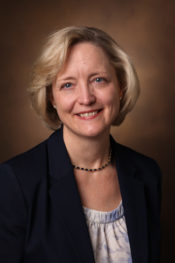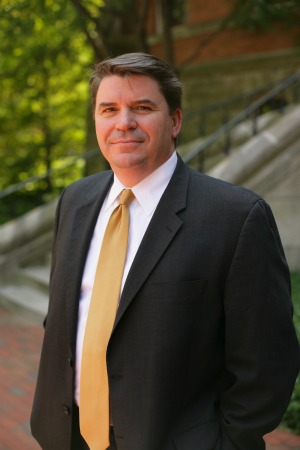
Vanderbilt will take stock of its resources for online education through the work of a new provost-appointed committee to ensure that the schools and colleges receive the needed support for these offerings, which advance the university’s mission of educating the whole student while encouraging lifelong learning.
Douglas L. Christiansen, vice provost for university enrollment affairs and dean of admissions and financial aid, will serve as committee chair.
“Online education expands the impact and reach of Vanderbilt’s excellence in teaching, with the additional benefit of often further connecting us to diverse groups of students and alumni,” said Provost and Vice Chancellor for Academic Affairs Susan R. Wente. “Vanderbilt’s online education strategy was framed in the Academic Strategic Plan, and is fully driven by the faculty and deans. There is no ‘one size fits all’; rather, we want each school and college to make the choices that are best for their mission. And, once a school or college has decided to launch online education efforts, it is critical that the resource needs and new advances in technology and pedagogy are available.”
The committee members are:

Douglas L. Christiansen (chair), vice provost for university enrollment affairs and dean of admissions and financial aid, associate professor of public policy and higher education, Peabody College of education and human development;
Leena Choi, associate professor of biostatistics, School of Medicine (Clinical);
Jay Clayton, William R. Kenan Jr. Professor of English, College of Arts and Science, director of the Curb Center for Art, Enterprise and Public Policy;
Corbette Doyle, senior lecturer of leadership, policy and organizations, Peabody College of education and human development;
Tracey George, vice provost for faculty affairs, Charles B. Cox III and Lucy D. Cox Family Chair in Law and Liberty, Law School;
Jen Gunderman, associate professor of musicology, Blair School of Music;
Akos Ledeczi, professor of engineering, School of Engineering;
Caitlin Moon, lecturer of law, director of innovation design, Program on Law and Innovation, Law School;
Maury Nation, associate professor of human and organizational development, Peabody College;
Kendra Oliver, assistant professor of pharmacology, School of Medicine (Basic Sciences);
Abby Parish, associate professor of nursing, School of Nursing;
Ranga Ramanujam, Richard M. and Betty Ruth Miller Professor of Healthcare Management, Owen Graduate School of Management;
Douglas Schmidt, associate provost for research development and technologies, Cornelius Vanderbilt Professor of Engineering (Computer Science), School of Engineering, Data Science Institute co-director; and
Phillis Sheppard, associate professor of religion, psychology and culture, Divinity School.
Schmidt, who is serving as chair of the Digital Projects and Services Committee, will be a liaison between the two committees to ensure assessments of digital tools for online course content creation are shared across the committees.
Vanderbilt’s online offerings include classes, degree and certificate programs, and blended educational programs (combinations of online and on-campus classes).
“We must seek to identify uniquely Vanderbilt online opportunities, while maintaining our admissions rigor and limited enrollment for degree-granting programs,” Christiansen said. “Undergraduate online classes will provide new resources and avenues of learning, but will also continue to be special and rare, given the university’s strong commitment to the residential experience, a pillar of the Academic Strategic Plan.”
Current undergraduate online offerings include an engineering management class targeted to students who cannot be on campus during the summer. Also, Vanderbilt, Duke and the University of Virginia partnered in 2015 to begin offering online classes in less commonly taught languages. Students at all three institutions can take K’iché Maya at Vanderbilt, Tibetan at Virginia, and Haitian Creole at Duke.
Vanderbilt, similar to most other top-tier research institutions, has moved strategically in the establishment of online graduate and professional programs.
The School of Nursing was an early proponent with its launch of a modified distance learning program in 1996. The school’s recent major building expansion includes a state-of-the-art virtual classroom. A master of nursing, doctor of nursing practice, and doctor of philosophy in nursing are all available online.
In 2017, Peabody College of education and human development partnered with digital education company 2U Inc. to power and support two online programs: a doctor of education in leadership and learning and a master of education in human development counseling.
This fall, the School of Engineering is launching a partnership with 2U for a master of science in computer science and a master of engineering in engineering management. Plans are also underway for the School of Medicine, Basic Sciences, to offer an online master of science in drug discovery in the future.
In addition to the degree-seeking programs, Vanderbilt offers several non-degree classes and programs that build alumni engagement and often connect different generations of students.
Non-degree examples at Vanderbilt include massive online open courses (MOOCs), which began in 2013 through a partnership with Coursera. There are currently 11 courses in the Vanderbilt MOOCS portfolio.
In October 2018, the Law School launched V-Legal Executive Certificate, in partnership with iLaw, to help today’s leaders navigate global legal environments and business environments.
The Online Education Committee is expected to work through the 2019-20 academic year and submit a report to the provost next spring.